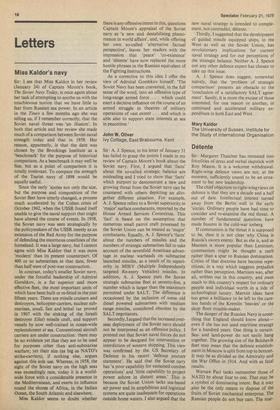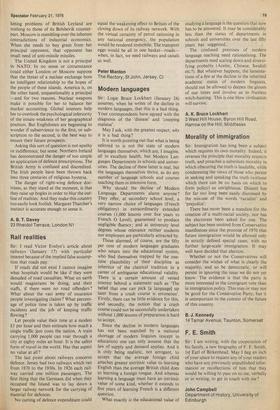Détente
Sir: Margaret Thatcher has retreated into frivolities of dress and verbal slapstick with Roy Mason. It is a welcome withdrawal. Right-wing defence views are not, at the moment, sufficiently sound to be an ornament to her new leadership.
The chief objection to right-wing views on defence is that they are a decade and a half out of date. Intellectual interest turned away from the Berlin wall in the early 'sixties. Ordinary people have had time to consider and re-examine the red threat. A number of fundamental questions have made fissures in the cold-war iceberg.
If communism is the threat it is supposed to be, then it is not clear why China is Russia's sworn enemy. But as she is, and as Maoism is more popular than Leninism, communism might be thought a curb rather than a spur to Russian domination. Critics of that doctrine have become repetitious, in a way which suggests prejudice rather than perception. Marxism was, after all, written out in this country, and owes much to this country's respect for ordinary people and individual worth in a tide of technological luxury. Marxist ideas have too great a brilliancy to be left to the careless hands of the Kremlin `heavies' or the shop floor trouble-maker.
The danger of the Russian Navy is something that England should know about— even if she has not used maritime strategy for a hundred years. One thing is certain. Seaand land-power do not easily hang together. The growing size of the Bolshevik fleet may mean that the defence establishment in Moscow is split from top to bottom. It may be as divided as the Admiralty and the War Office in 1914. And with as fatal results.
Warsaw Pact tanks outnumber those of NATO by about four to one. That may be a symbol of dominating intent. But it may also be the only means to dispose of the fruits of Soviet mechanical enterprise. The Russian people do not buy cars. The mar keting problems of British Leyland are nothing to those of its Bolshevik counterpart. Moscow is stumbling over the inherent contradictions of industrial economics. When she needs to buy grain from her principal opponent, that opponent has small need of anti-missile missiles.
The United Kingdom is not a principal in NATO. In no sense or circumstance could either London or Moscow suppose that the threat of a nuclear exchange bore an intelligent relationship to the hopes of the people of these islands. America is, on the other hand, unquestionably a principal —and for two reasons. Nuclear weapons make it possible for her to balance her market accounting. Global interests help her to overlook the psychological inferiority of the innate weakness of her geographical position. But Englishmen are beginning to wonder if subservience to the first, or subscription to the second, is the best way to ensure their future prospects.
Asking this sort of question is not apathy or indifference, but sense. Northern Ireland has demonstrated the danger of too simple an application of defence prescriptions. The British Army is confused and discredited. The Irish people have been thrown back into three centuries of religious hysteria.
The danger of right-wing defence doctrines, as they stand at the moment, is that they raise up bogies in order to blur the outline of realities. And they make this country too easily look foolish. Margaret Thatcher's instinct is accurate enough to sense it.
A. B. T. Davey 23 Rheidol Terrace, London Ni



































 Previous page
Previous page